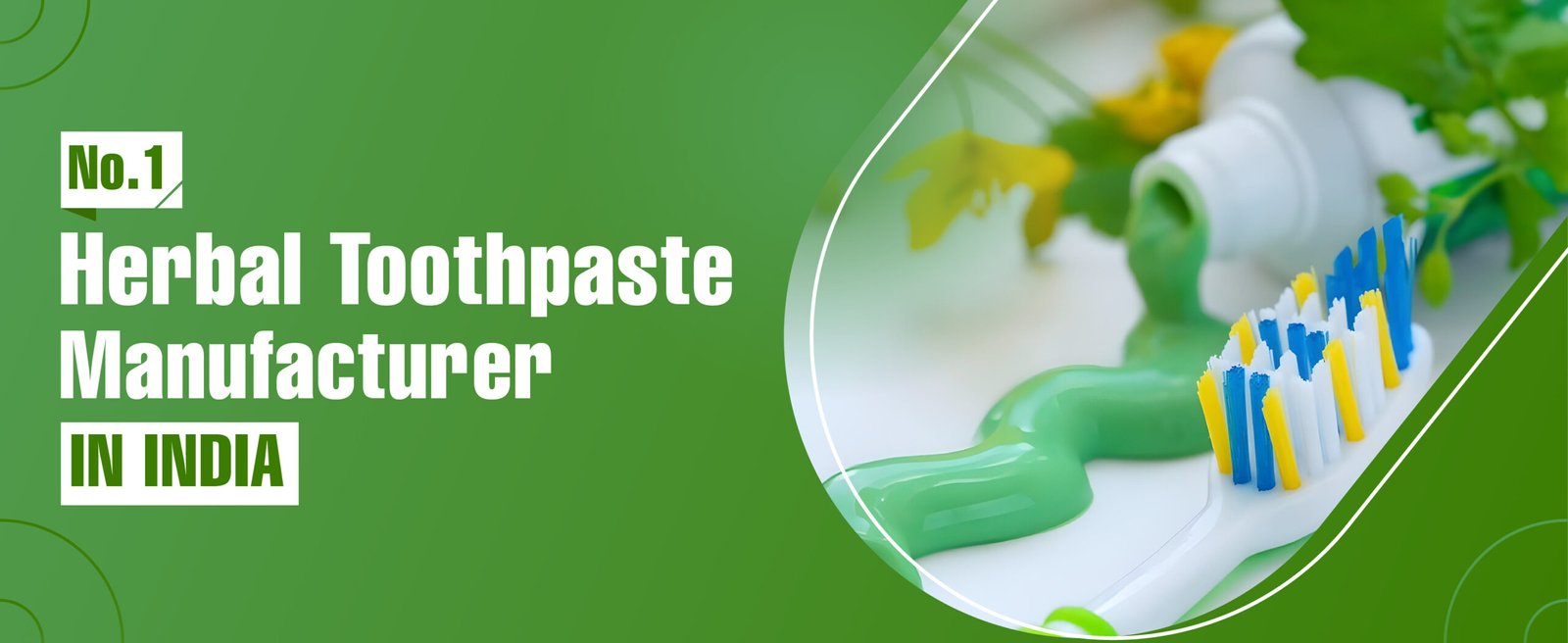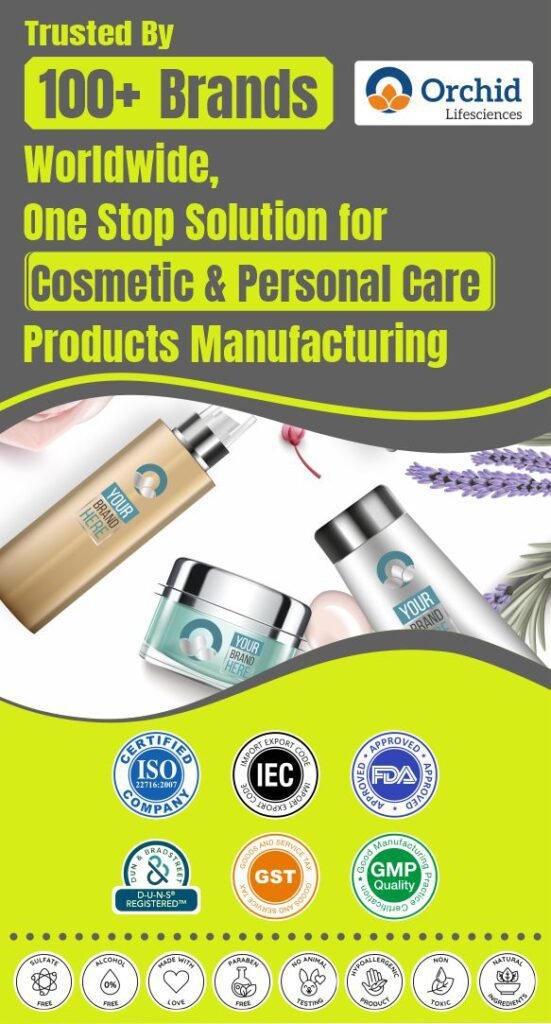The herbal toothpaste market in India has seen significant growth, driven by increasing consumer awareness of natural and sustainable Oral Care products. As demand for safer and more effective alternatives to chemical based products rises, manufacturers across the country, particularly in regions like Ahmedabad and Gujarat, have emerged as key players in this industry. These manufacturers are known for producing a wide range of herbal toothpaste options, including popular formulations like neem toothpaste, Charcoal toothpaste, and gel toothpaste. Moreover, they cater to diverse market needs, offering specialized products such as whitening toothpaste for Teeth whitening.
In addition to their product diversity, many of these manufacturers also engage in Contract manufacturing, providing Private label toothpaste solutions to both domestic and international brands. The trend towards Private label manufacturing has gained traction as companies seek to offer customized oral care solutions under their own brand names. With advanced production facilities and a strong focus on quality, these manufacturers in India are well-positioned to meet the growing global demand for natural and effective oral care products.
1. Orchid Lifesciences
Orchid Lifesciences has emerged as a leading herbal toothpaste manufacturer in India, thanks to one of the best Third party Herbal Toothpaste manufacturers in India – Orchid Lifesciences’s commitment towards quality, innovation, and sustainable practices. Our hard work has helped us deliver multiple oral, skin, hair, baby, and beauty care products to various countries, including India. Worried about SAFTEY & QUALITY? We at Orchid Lifesciences have A specially trained team of R&D to check the product at every stage of the process starting from manufacturing products. Along with this Orchid Lifesciences has been certified by many reputed associations like WHO- GMP facility, ISO 22716 certified, DUNS registered and GST Compliant which makes them a popular choice not only in India but also in countries across the globe.
All this is possible because of the hard efforts of our experts with 40+ years of dedicated experience and Orchid’s Amazing facility setup capable of catering to various batch sizes ranging from 25 kgs to 2000 kgs per batch, Orchid Lifesciences have MORE FOR YOU!! Our filling capacity can also fill 25 to 55 Lakh tubes, 5 to 15 Lakh bottles, and 5 to 12 Lakh jars per month. They also introduced new pouch packaging machines with a filling capacity of 55 Lakh pouches per month. What are you waiting for? Connect with us TODAY!! Via mediums mentioned 👇
Address:
Plot No. 68-72, Tribhuvan Industrial Estate, Road No.11, Nr. Kathwada GIDC, Kathwada, Ahmedabad, Gujarat-382430
Contact:
+91-8980815444
+91-9898026828
+91-9922840985
Email – marketing@orchidlifesciences.com
Website:
https://orchidlifesciences.com/
2. Dabur India Ltd.
Dabur India Ltd. is one of the oldest and most well-known names in the Indian herbal products industry. Founded in 1884, Dabur has a long history of producing Ayurvedic and herbal products, including toothpaste. Their “Dabur Red Toothpaste” is one of the most popular herbal toothpaste brands in India, known for its unique blend of traditional herbs like clove, mint, and pippali.
Dabur’s production facilities are equipped with state-of-the-art technology, allowing them to maintain strict quality control standards throughout the manufacturing process. The company is also committed to sustainability, using eco-friendly packaging and sourcing organic ingredients wherever possible.
3. Patanjali Ayurved Ltd.
Patanjali Ayurved Ltd., founded by Baba Ramdev and Acharya Balkrishna in 2006, has quickly become one of the most influential players in the Indian herbal products market. Patanjali’s “Dant Kanti” toothpaste is a household name in India, known for its Ayurvedic formulation that includes ingredients like neem, babool, and turmeric.
Patanjali’s production facilities are located in Haridwar, Uttarakhand, where they produce a wide range of Ayurvedic and herbal products. The company places a strong emphasis on research and development, continually innovating to create new and improved products that meet the needs of modern consumers.
4. Himalaya Wellness Company
Himalaya Wellness Company, established in 1930, is another leading player in the Indian herbal toothpaste market. The company is known for its scientifically-backed Ayurvedic products, including the popular “Himalaya Herbals Complete Care Toothpaste,” which contains ingredients like neem, pomegranate, and meswak.
Himalaya’s production facilities are located in Bangalore, Karnataka, where they use advanced technologies and sustainable practices to produce their products. The company is also known for its commitment to quality, with all its products undergoing rigorous testing to ensure they meet the highest standards.
The Rise of Herbal Toothpaste in India
Historical Roots of Herbal Oral Care in India
India has a long and rich history of using herbal remedies for health and wellness, a tradition that dates back thousands of years. Ayurveda, the ancient system of medicine that originated in India, places a strong emphasis on the use of natural ingredients for maintaining health and treating ailments. Oral care is no exception, with Ayurvedic texts detailing various herbs and natural substances that can be used to clean teeth, strengthen gums, and freshen breath.
Herbal toothpaste is essentially a modern adaptation of these traditional practices. Long before the advent of commercial toothpaste, Indians used a variety of natural substances for oral care, including neem twigs, salt, charcoal, and a mixture of herbs. These practices have been passed down through generations, and even today, many rural and urban households continue to use these traditional methods for oral hygiene.
The modern herbal toothpaste industry in India has its roots in these ancient practices. Over the years, manufacturers have refined and commercialized these traditional formulations, combining them with modern scientific research to create products that are effective, safe, and appealing to contemporary consumers.
Key Factors Driving the Growth of Herbal Toothpaste
Several factors have contributed to the rapid growth of the herbal toothpaste market in India. One of the most significant is the increasing awareness among consumers about the potential health risks associated with chemical-based products. Ingredients such as fluoride, triclosan, and sodium lauryl sulfate (SLS), which are commonly found in conventional toothpaste, have come under scrutiny for their potential side effects. This has led to a growing demand for natural alternatives that are free from harmful chemicals.
Another key driver is the resurgence of interest in Ayurveda and other traditional medicine systems. As consumers seek more natural and holistic approaches to health, they are increasingly turning to Ayurvedic products, including herbal toothpaste. The government’s promotion of Ayurveda as a key part of India’s healthcare system has also played a role in boosting the popularity of herbal products.
In addition to health concerns, environmental awareness is also driving the demand for herbal toothpaste. Many consumers are seeking out products that are not only good for their health but also for the planet. Herbal toothpaste, with its natural ingredients and often eco friendly packaging fits the bill perfectly for these environmentally-conscious consumers.
Current Market Trends and Consumer Preferences
The Indian herbal toothpaste market is characterized by several trends that reflect changing consumer preferences. One of the most notable trends is the shift towards premiumization. As consumers become more discerning, they are willing to pay a premium for high quality products that offer additional benefits, such as whitening, sensitivity relief, and gum care.
Another trend is the increasing popularity of multi-herb formulations. While single-ingredient toothpaste, such as neem or clove, remains popular, many consumers are now looking for products that combine the benefits of multiple herbs. These multi-herb formulations are perceived as more effective and offer a broader range of benefits, making them a popular choice among consumers.
The rise of e-commerce has also had a significant impact on the herbal toothpaste market. With the increasing penetration of the internet and smartphones, more and more consumers are purchasing their toothpaste online. This has opened up new opportunities for manufacturers to reach a wider audience and cater to the growing demand for herbal products.
Key Ingredients in Indian Herbal Toothpaste
1. Common Herbs Used in Indian Herbal Toothpaste
Indian herbal toothpaste is formulated using a wide variety of herbs, each of which has unique properties that contribute to oral health. Some of the most commonly used herbs in Indian herbal toothpaste include:
- Neem: Known for its antibacterial and antifungal properties, neem is one of the most popular ingredients in herbal toothpaste. It helps in preventing cavities, reducing plaque, and treating gum diseases.
- Clove: Clove oil is widely used in herbal toothpaste for its analgesic and anti-inflammatory properties. It helps in relieving toothaches, reducing gum inflammation, and freshening breath.
- Tulsi (Holy Basil): Tulsi is revered in Ayurveda for its medicinal properties. In herbal toothpaste, it is used for its antibacterial and anti-inflammatory effects, which help in maintaining healthy gums and preventing oral infections.
- Miswak (Salvadora persica): Miswak is a traditional teeth-cleaning tool that has been used for centuries in India and the Middle East. It is known for its antibacterial properties and helps in strengthening gums and preventing tooth decay.
- Amla (Indian Gooseberry): Amla is rich in vitamin C and antioxidants, which help in strengthening teeth and gums. It also has anti inflammatory properties that can reduce gum swelling and bleeding.
2. Benefits of Each Herb for Oral Health
- Neem: Its antibacterial properties help kill harmful bacteria in the mouth, reducing the risk of cavities and gum infections. Neem also has anti-inflammatory effects that can soothe irritated gums.
- Clove: The eugenol in clove oil acts as a natural pain reliever, making it effective in treating toothaches. Clove also has antimicrobial properties that help in reducing plaque and preventing bad breath.
- Tulsi: Tulsi’s antibacterial properties help keep the mouth free from harmful bacteria, while its anti-inflammatory effects can reduce gum inflammation and promote overall oral health.
- Miswak: Miswak’s antibacterial and astringent properties help prevent tooth decay, reducing plaque buildup, and strengthening the gums. It also has a natural abrasive effect that helps in cleaning the teeth effectively.
- Amla: Amla’s high vitamin C content helps in strengthening the gums and preventing gum diseases. Its antioxidant properties also protect the teeth and gums from damage caused by free radicals.
Traditional Formulations and Modern Innovations
Traditional formulations of herbal toothpaste in India have been based on the principles of Ayurveda, which emphasize the use of natural ingredients for health and wellness. These formulations often include a combination of herbs that work together to promote oral health. For example, a traditional Ayurvedic toothpaste might include neem for its antibacterial properties, clove for pain relief, and tulsi for its anti-inflammatory effects.
In recent years, there has been a growing trend towards modernizing these traditional formulations to make them more appealing to contemporary consumers. This has led to the development of new formulations that combine traditional herbs with modern ingredients and technologies. For example, some manufacturers are now incorporating natural whitening agents, such as baking soda, into their herbal toothpaste formulations to meet the demand for teeth-whitening products.
Another innovation in the herbal toothpaste market is the use of natural flavours and sweeteners. While traditional herbal toothpaste often had a strong, sometimes bitter taste, modern formulations are now available in a variety of flavours, such as mint, lemon, and orange, making them more palatable for consumers.
Leading Herbal Toothpaste Manufacturers in India
1. Production Facilities and Technologies Employed
The production facilities of herbal toothpaste manufacturers in India are equipped with advanced technologies that ensure the highest standards of quality and efficiency. These facilities are designed to handle the delicate process of extracting and processing natural ingredients, ensuring that the beneficial properties of the herbs are preserved throughout the production process.
Common technologies used in these facilities include cold-press extraction, which helps retain the potency of the herbal ingredients, and advanced filtration systems, which ensure the purity of the final product. In addition to these technologies, many manufacturers also employ eco-friendly practices, such as using renewable energy sources and minimizing waste.
Packaging is another important aspect of the production process, with many companies opting for biodegradable or recyclable materials. This not only reduces the environmental impact of their products but also appeals to consumers who are looking for more sustainable personal care options.
2. Quality Standards and Certifications Upheld by Indian Manufacturers
Quality is a top priority for herbal toothpaste manufacturers in India, and most companies go to great lengths to ensure their products meet the highest standards. This includes obtaining various certifications that demonstrate their commitment to quality and safety.
Common certifications held by these manufacturers include ISO 9001 (Quality Management System), GMP (Good Manufacturing Practices), and Organic certifications. These certifications are often required for exporting products to international markets, where consumers expect high-quality, safe, and effective products.
In addition to these certifications, many companies in India also follow Ayurvedic and traditional medicine standards, ensuring that their products are not only safe and effective but also align with the principles of natural and holistic health.
Challenges Faced by Herbal Toothpaste Manufacturers in India
1. Regulatory and Compliance Challenges
One of the significant challenges faced by herbal toothpaste manufacturers in India is navigating the complex regulatory landscape. The production and sale of herbal products in India are governed by a range of laws and regulations, including the Drugs and Cosmetics Act, of 1940, and the Food Safety and Standards Act, of 2006. Compliance with these regulations can be challenging, particularly for smaller manufacturers who may lack the resources to navigate these requirements effectively.
In addition to domestic regulations, manufacturers looking to export their products must also comply with the regulatory requirements of the target markets. This can add another layer of complexity, requiring companies to invest in specialized knowledge and expertise to ensure compliance with international standards.
2. Sourcing and Consistency of Raw Materials
Sourcing high-quality raw materials is another significant challenge for herbal toothpaste manufacturers in India. The effectiveness of herbal toothpaste depends largely on the quality of the herbs and other natural ingredients used in its formulation. However, sourcing these ingredients can be difficult, particularly for companies that prioritize organic and sustainably sourced materials.
The availability of certain herbs can also be affected by factors such as climate change, which can impact crop yields and, in turn, lead to fluctuations in the cost and availability of raw materials. This makes it challenging for manufacturers to maintain consistent production levels and meet the growing demand for their products.
3. Competition from Both Domestic and International Brands
The herbal toothpaste market in India is highly competitive, with numerous established brands vying for market share. In addition to competing with other Indian herbal toothpaste manufacturers, companies also face competition from international brands that have entered the market to capitalize on the growing demand for natural products.
To succeed in this competitive environment, manufacturers must differentiate their products through quality, innovation, and effective marketing. This often requires significant investment in research and development, as well as in branding and promotion.
Consumer Preferences and Emerging Trends
1. Factors Influencing Consumer Choices in Herbal Toothpaste
Consumers who choose herbal toothpaste are typically looking for products that are natural, safe, and effective. These consumers are often health-conscious individuals who are concerned about the potential side effects of chemical-based toothpaste and are seeking a more holistic approach to oral care.
Key attributes that consumers look for in herbal toothpaste include:
- Natural Ingredients: Consumers prefer toothpaste that contains natural and organic ingredients, free from synthetic chemicals.
- Efficacy: Consumers expect herbal toothpaste to be as effective as conventional toothpaste in cleaning teeth, preventing cavities, and maintaining oral health.
- Flavour and Freshness: The taste and freshness of the toothpaste are important considerations, with many consumers prefer flavours like mint, clove, and fennel.
- Packaging: Eco-friendly packaging is increasingly important to consumers, who are looking for products that align with their environmental values.
2. The Shift Towards Natural and Organic Products
There has been a significant shift towards natural and organic products in India, driven by a growing awareness of the potential health and environmental impacts of synthetic chemicals. This trend is particularly strong among younger consumers, who are more likely to seek out products that align with their values.
In the toothpaste market, this shift has led to increased demand for herbal and natural products, with consumers willing to pay a premium for toothpaste that is free from harmful chemicals and made with sustainably sourced ingredients.
3. Market Trends Specific to Urban vs. Rural India
In urban areas, the demand for herbal toothpaste is driven by factors such as increased health consciousness, exposure to global trends, and higher disposable incomes. Urban consumers are more likely to seek out premium products that offer additional benefits, such as whitening and sensitivity relief, and are also more likely to purchase their toothpaste online.
In rural areas, the demand for herbal toothpaste is often driven by traditional practices and the cultural significance of herbal remedies. Many rural consumers continue to use traditional methods of oral care, such as neem twigs and are more likely to trust herbal toothpaste that is based on these practices. Price is also an important consideration for rural consumers, who are more likely to choose affordable, locally produced herbal toothpaste.
Future Prospects for Herbal Toothpaste Manufacturers in Indian Industry
1. Growth Opportunities in Domestic and International Markets
The prospects for the herbal toothpaste industry in India are bright, with significant growth opportunities in both domestic and international markets. In India, the demand for herbal toothpaste is expected to continue growing, driven by the increasing popularity of natural and organic products.
Internationally, there is also a strong demand for herbal toothpaste, particularly in markets like North America, Europe, and Asia. Indian manufacturers are well-positioned to capitalize on these opportunities, thanks to their commitment to quality and their ability to produce high-quality products at competitive prices.
2. Government Initiatives and Support for the Herbal Sector
The Indian government has launched several initiatives aimed at promoting the herbal and Ayurvedic industries, which are expected to benefit herbal toothpaste manufacturers. These initiatives include financial incentives, tax benefits, and support for research and development.
The government has also been promoting the export of herbal products, assisting companies looking to expand their presence in international markets. This support is expected to drive further growth in the industry, helping Indian manufacturers to compete on a global scale.
3. Technological Advancements and Innovation in Manufacturing
Technological advancements are also expected to play a key role in the future growth of the herbal toothpaste industry in India. Innovations in areas such as extraction techniques, formulation, and packaging are helping manufacturers to improve the quality and efficacy of their products.
In addition to these technological advancements, there is also a growing focus on research and development, with companies investing in the development of new and improved products that meet the changing needs of consumers. This focus on innovation is expected to drive continued growth in the industry, helping Indian manufacturers to stay competitive in a rapidly evolving market.
Conclusion
In conclusion, the herbal toothpaste industry in India has established itself as a thriving sector, with several top toothpaste manufacturers in India leading the way in producing high-quality, natural toothpaste. Companies like those in Maharashtra and Gujarat, including Orchid Lifesciences are recognized as some of the best herbal toothpaste manufacturers and suppliers in India, offering a wide range of ayurvedic products that cater to diverse oral care needs. These manufacturers excel in producing sls free toothpaste, chemical-free toothpaste, and innovative formulations like meswak toothpaste and teeth whitening toothpaste, all of which are crafted using natural herbs and ingredients recommended for cavity protection and overall dental care.
Indian toothpaste manufacturers, including herbal and ayurvedic toothpaste manufacturers in India, not only serve the domestic market but also position themselves as leading exporters, providing high-quality herbal products to a global audience. The toothpaste manufacturing company in India often offers third-party toothpaste manufacturing services, including private label toothpaste, enabling them to provide customized oral care solutions at the best price. Companies like Orchid Lifesciences, located in industrial estates such as Tribhuvan Estate, continue to be recognized among the top herbal toothpaste manufacturers for their commitment to quality and innovation.
Whether through contract manufacturing or supplying a wide range of products, these herbal toothpaste manufacturing companies deliver some of the best quality herbal toothpaste available. By offering private label manufacturing services, they cater to a growing demand for personalized oral care products, solidifying their reputation as one of the top providers in the industry. As the market continues to expand, driven by the increasing preference for natural ingredients and ayurvedic solutions, these companies will continue to play a crucial role in shaping the future of dental care both in India and globally.






